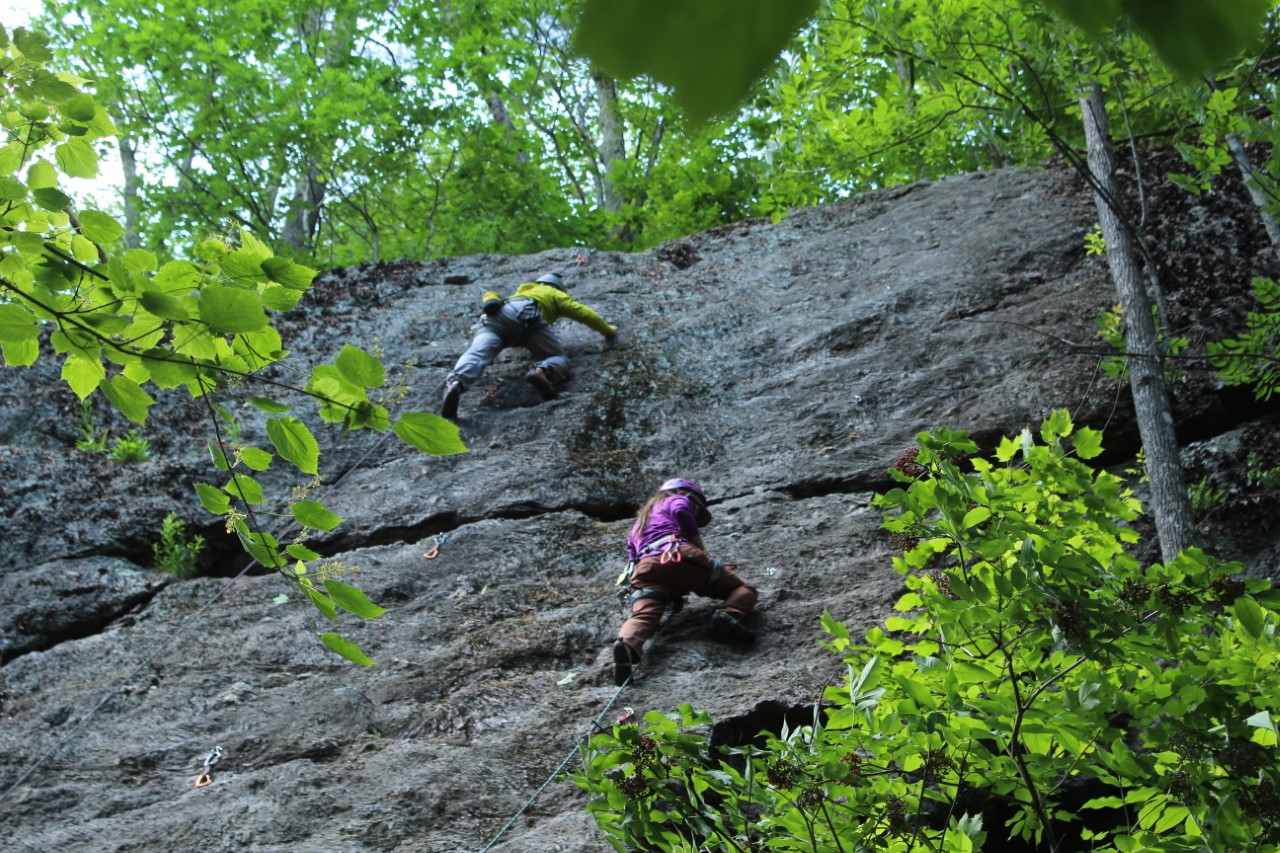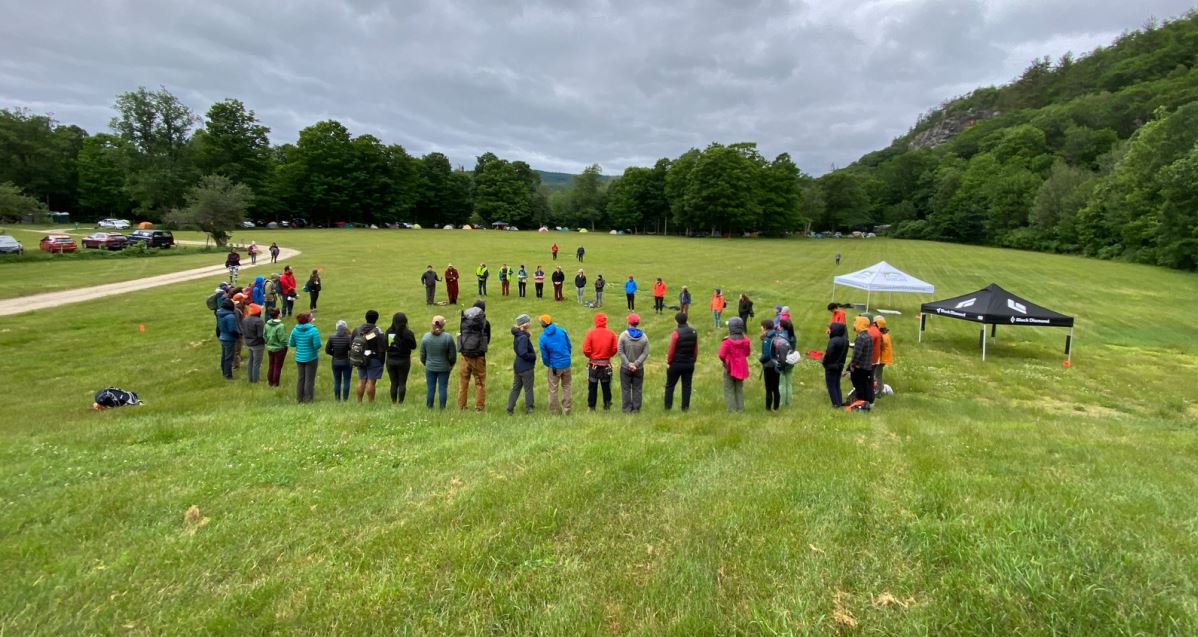Rumney Together: Lessons from AMC’s Inaugural Climbing Festival

The outdoor recreation and conservation industries play a significant role in advancing social justice principles to foster a more inclusive environment for Black, Indigenous, People of Color (BIPOC) communities, as well as those from other marginalized groups. Recognizing this reality, the organizers of the Rumney Together climbing festival dove headfirst into bringing important conversations to the sport to create an inclusive and safe environment for climbers of all identities.
Held in Rumney, N.H., from June 17-19, the inaugural Rumney Together festival welcomed more than 100 climbers to deepen conversations around how socioeconomic barriers permeate the sport and what actionable steps outdoor groups can take to make climbing more engaging with diverse populations. The festival was hosted by the New Hampshire and New York–North Jersey Chapters of the AMC. Partners of the event included AMC Volunteers, Black Diamond, American Alpine Club and Climb United, Access Fund, Rumney Climbers Association, ParaCliffHangers, Ladies Climbing Coalition, and Indigenous Field Guide.
The idea started when a group of climbing advocates from different AMC chapters met at an in-person event in 2019, explains RJ Lau, co-chair for the New York–North Jersey Climbing Committee and co-organizer of Rumney Together. After conversations and reflecting on their own experiences at other widely known climbing festivals, the advocates had the idea to implement a similar framework in a more grassroots, intimate setting to address some of the concerns that saturate climbing culture. Those concerns included gatekeeping, toxic masculinity, lack of BIPOC representation, racist route names, and impact to cultural resources. Over three days, festival attendees participated in a Q&A discussion with professional athletes, climbing clinics focused on skill and relationship building, a land acknowledgement and blessing ceremony, an observance of Juneteenth, plus plenty of opportunities to climb.
Fireside Panels
The organizers of Rumney Together originally planned to have seven outdoor, individual fireside chats facilitated by partner representatives on a variety of topics where participants could choose what they wanted to attend. Due to rain, the format of the fireside chats transitioned into a Q&A session where everyone gathered in the barn on the campground. Each representative had 15 minutes to cover their topic and then engage with the audience in an open discussion.
The topics discussed included:
- Healthy communication in climbing partnerships with professional climber Nina Williams
- A conversation on addressing toxic masculinity with Sarah Bucknam from Ladies Climbing Coalition
- Stewardship and building local relationships with Lee Hansche and Madeline McElaney from Rumney Climbers’ Association
- Conserving climbing areas with Mike Morin and Briana Mazzolini-Blanchard from Access Fund
- Getting to know Appalachian Mountain Club’s Inter-Chapter Climbing Committee with Bill Fogel and Frannie Bui
- Public education to prevent the damage of nonrenewable cultural resources with Briana Mazzolini-Blanchard, co-founder of Indigenous Field Guide
- Behavior, best practices, minimum impact ideal, and codes of conduct with professional climber, Sam Elias
Nina Williams, a professional rock climber and a Board Member of the American Alpine Club, shared her experience during the Q&A where she talked about healthy communication, partnerships, fear management, and more. “If anything, I want more conversations that hold a little bit of tension. Someone who is leading the chat needs to be willing to hold some of that tension,” Williams said. People in the audience were incredibly engaged, chiming in, saying that they’d like to be heard. They felt safe enough to be vulnerable and have hard conversations.
Sam Elias, a professional rock climber, reiterated that conversations about behavior, ethics, code of conduct, and climbing etiquette with large climbing product companies and leadership staff of outdoor recreation organizations are important. He explained, “It comes down to broader corporate and organizational accountability. The effort that it takes from any one of [us] during these weekends pales in comparison to what one of these massive, climbing product companies can do in a day.”

What Climbing Means to Attendees
Many of the attendants at the festival said that Rumney Together was an opportunity to reflect on what climbing means for them, as well as the chance to build confidence and skills.
Christiana Gozo explained, “I’ve grown a lot through climbing. It’s uniquely positioned to teach skills around tolerating frustration, dealing with discomfort and fear, and pushing through those self-constructed barriers [specifically through] creating a model for yourself [and] being able to translate those skills off the wall. It’s important to have people around me that enjoy climbing for those reasons too.”
Susan Din added, “It feels like everyone is always rooting for you. We all have different projects, goals, body types, risk levels, and so I think there’s a deep respect for that in the climbing community.”
Another participant, Frannie Bui, a member of the AMC Boston Chapter Mountaineering Committee and co-founder of SendHers, recounted the support she felt during an injury that she sustained at the festival and reiterated the power of vulnerability and representation in the climbing space. She said, “As my group assisted me down the mountain, I burst into tears. I was surrounded by people who look like me. I was surrounded by women of color who were there to support me, that I connected with, and that helped me feel safe while I processed tough emotions.”
Land Acknowledgement and Juneteenth Observance
The organizers of Rumney Together worked collaboratively with the Ko’asek Traditional Band of the Abenaki Sovereign Nation and Indigenous Field Guide to observe a land acknowledgment and blessing ceremony held the first morning of the festival prior to the start of the climbing clinics. Led by Elder Dan, a respected community leader, participants gathered in the open space next to the barn and stood in a large circle. He spoke about the significance and long history of the land they were recreating on.
“I really appreciated the authenticity around inviting the Indigenous tribes in that area to do a blessing,” said Briana Mazzolini-Blanchard, Strategic Partnerships Manager at Access Fund, and co-founder of Indigenous Field Guide. “It’s one thing to invite an Indigenous tribe from the area, but what work has come before that and what will follow? Everything is empty when it’s not prefaced and followed up by deep work. What Indigenous Field Guide says is, exploration and first ascents will never be more important than the protection of Indigenous cultural resources that are dwindling. This is a pivotal moment for organizations that are either going to say yes or no. I’m looking forward to and curious to see who takes this next step in prioritization.”
On Sunday, the last day of the festival and Juneteenth, Colin Aina, a member of the AMC-NH Mountaineering Committee, led the observance where folks gathered in a circle and Aina spoke a few words. He reflected, “I tried to shed some light and clarity on a part of our American history that sadly is still unknown or misunderstood. An overwhelming majority of the participants exhibited that they had only been made aware of Juneteenth within the past two years. Hopefully, through events like Rumney Together, we will all learn to become more aware and observant of parts of our history that have been sanitized out of textbooks.”

Looking Ahead
So, how do we follow up with this deep work? According to Sam Elias, a professional climber, “[Being part of these spaces] was a moment for me to reflect on my own identity so that I can provide support. It’s about shifting the conversations into deeper realms. There is immense potential in these conversations because there has been so much trauma, harm, and difficulty, and knowing two sides of the struggle and unfairness, but also hopefully knowing the joy, the bliss, the connection… that’s a beautiful part of life, and that’s what I’ve found when I show up.”
There is power in vulnerability, and that willingness to be vulnerable in conversation leads to expansion within individuals, with each other, and within communities. Outdoor entities and climbers have more work to do to create equitable access to the outdoors. It starts with internal reflection of existing practices followed by direct action. Talk to your gym’s leadership and your fellow climbers; have hard conversations about expanded, intersectional programming. Reach out to your Local Climbing Organization (LCO) for support in starting and maintaining those conversations, and if your region doesn’t have one, consider starting one. Reflect on your own identity, and ask yourself, “What value has climbing and outdoor recreation as a whole added to my life, and how can I start momentum to share that with others?”
Rumney Together serves as a testimony to the importance of advancing social justice principles. AMC takes these principles seriously. We believe the outdoors is for everyone, and we’re dedicated to understanding and breaking down the barriers preventing that.
We are at a pivotal point for the industry and local communities to act, and these lessons can also be applied to other outdoor recreation groups and sports as well. Manager of the Climb United program at the American Alpine Club, Shara Zaia, said, “I hope sooner rather than later, we will see Justice, Equity, Diversity, Inclusion (JEDI) integrated seamlessly into all programs and spaces. Until then, we will continue to build spaces that foster BIPOC joy.”




